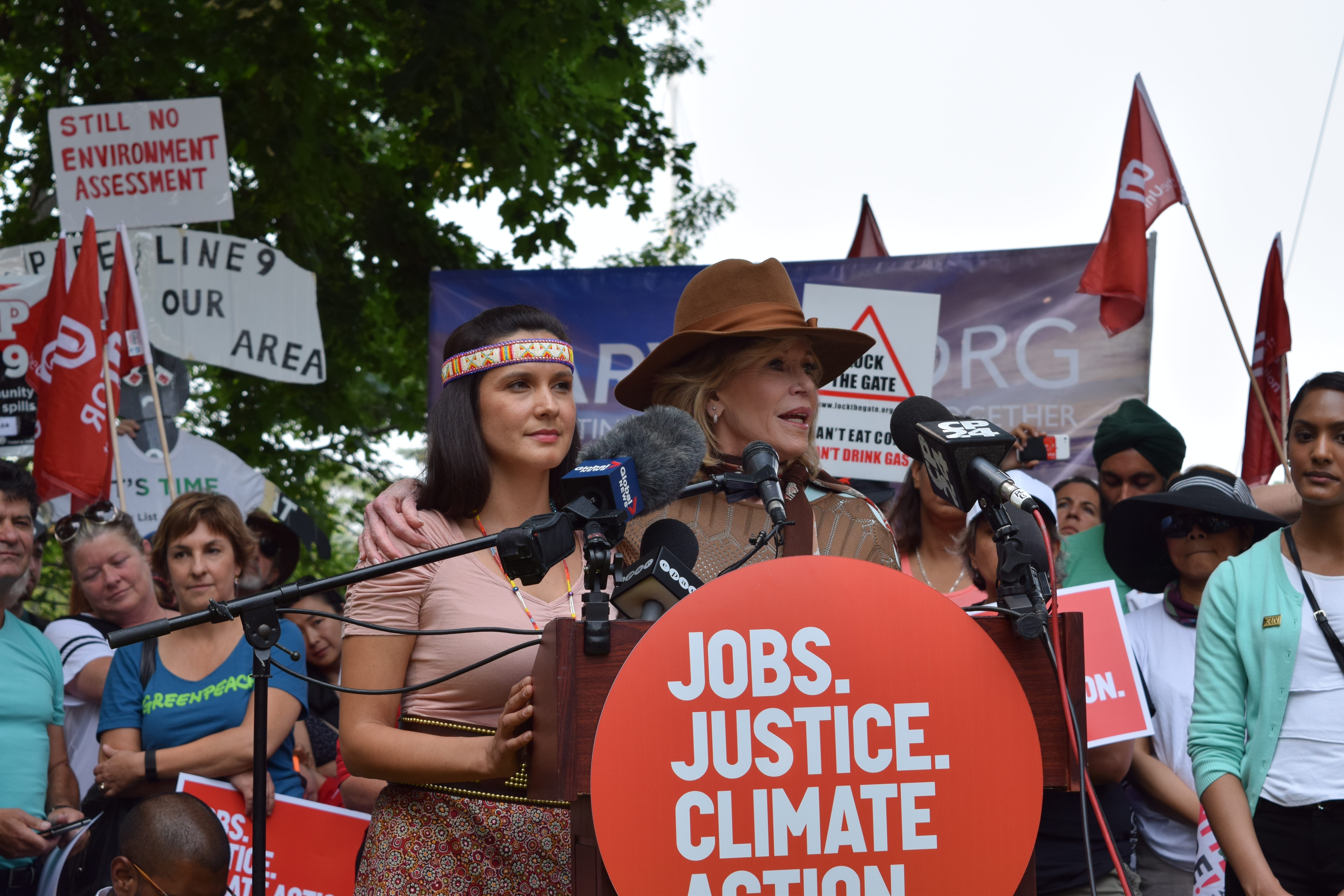Chip in to keep stories like these coming.
The March for Jobs, Justice and the Climate filled the streets of downtown Toronto today, demanding a justice-based transition to a green-energy economy.
A press release sent after the Toronto march pegged the number of marchers at over 10,000 including celebrities Jane Fonda and David Suzuki.
The thousands in Toronto were not the only people to take part this weekend. Events for jobs, justice and the climate were held in cities and towns across Canada.
In Toronto, speakers at the march called out the myth of the choice between the economy and the environment as they pushed for a new, green energy economy.
“They are saying we do have to choose between the environment and the economy — that is a false choice,” said Fonda, who came to Toronto to support the march. “In fact, renewable energy and doing away with the fossil fuel-based economy will create more jobs, more justice and more democracy.”
Suzuki expressed a similar sentiment.
“When we say, as our prime minister has, that we can’t do anything about climate change or it’ll destroy our economy, we elevate the economy over the very atmosphere that keeps us alive. This is suicidal. This is insane,” he said.
The event started with speakers from a coalition of social justice and climate organizations that got the crowd chanting and cheering in Queen’s Park. The march then proceeded through the downtown core along University Avenue, across Dundas Street and up Jarvis before concluding with celebrations in Allan Gardens.
David Suzuki referred to environmental changes in his Vancouver home, saying the city hasn’t had rain in two months despite being in the middle of a rainforest. He said he feels Canadians expect more from their elected leaders when it comes to climate issues.
“We need leadership because the decisions made now, or not made now, aren’t going to affect old farts like me. They’ll reverberate through the lives of young people. There should be a category of inter-generational crime,” said Suzuki.
Protestors were calling on elected leaders too — labour movement marchers at the rally held paper maché likenesses of Ontario Premier Kathleen Wynne and Prime Minister Stephen Harper.
Christopher Wilson of the Public Service Alliance of Canada (PSAC), who was carrying the paper maché Harper, said his union was opposed to the 10,000 public service jobs that the prime minister has cut.
Marchers were there to express their dissatisfaction with inneffective climate leadership.
“It just seems like policy leaders aren’t taking a stand on climate change and it’s something that absolutely needs to happen. A large number of people care, and we’re ready to mobilize,” said marcher Catherine Gournblaine, a student from Wilfrid Laurier University.
Throughout the speeches and the march, organizers stressed how important social justice is to a new green economy.
“Today’s whole theme of jobs justice and the climate is that it really starts with justice. Justice meaning respecting the rights of Indigenous peoples, respecting migrant workers and definitely respecting those who are hit first and foremost by climate change — that’s the poor,” Clayton Thomas-Muller said.
Nigel Barriffe, a schoolteacher and president of the Urban Alliance on Race Relations, spoke out about racial profiling, carding and police brutality.
“As a school teacher in North Etobicoke, Line 9 runs through the backyards of many families that I teach,” he said. “We know that climate change has a direct impact worst and first on racialized and marginalized communities.”
Melina Laboucan-Massimo, a Lubicon Cree and campaigner with Greenpeace, saw that first hand when her home in the tar sands was ravaged during the 2011 Alberta oil spill.
“My family called me, texted me, that they couldn’t breathe and that their eyes were burning. They were nauseous and they didn’t know what was happening. What we found out five days later was it was a massive oil spill. 4.5 million litres, 28,000 barrels, had leaked into our traditional territory,” she said.
For her, that catastrophe was an awakening as to the destructive power of the fossil fuel economy.
Naomi Klein, who spoke at the launch of the march, recently wrote that the key to moving forward is putting people and the planet first.
Activists from grassroots organizations got the crowd motivated on the steps of Queen’s Park.
Ellen Gabriel, a Mohawk activist, demanded justice when she declared “Canada’s prosperity has been on the backs of Indigenous peoples.”
Two oil divestment activists from the University of Toronto called on universities to remove investments from the fossil fuel industries to retain integrity.
“If it is wrong to wreck the planet then it is wrong to profit from that wreckage,” said Amanda.
Syed Hussan of No One is Illegal pointed the finger at oil company executives on Bay Street and whipped the crowd into a frenzy before the march departed Queen’s Park speaking about climate justice and human rights.
The March for Jobs, Justice, and the Climate falls on the eve of the Climate Summit of the Americas hosted in Toronto. It’s an opportunity for social movements to speak up.
“First nations, labour unions, working people, students — this is the kind of coalition that will make the difference,” Fonda said.
Megan Devlin is rabble’s news intern for 2015. She hails from Toronto, but she’s starting her Masters in Journalism in Vancouver. She got her start in journalism working at the Western Gazette where she was a news editor for volume 107 and online associate editor for volume 108.
Chip in to keep stories like these coming.



